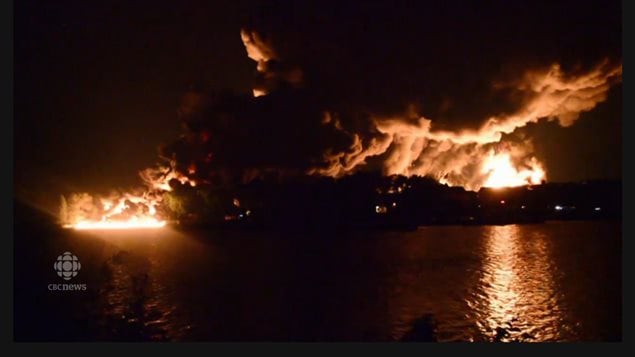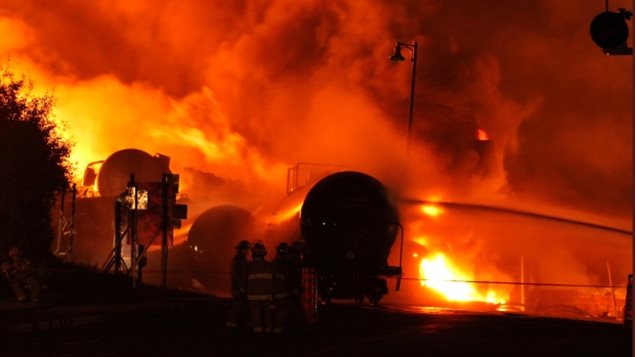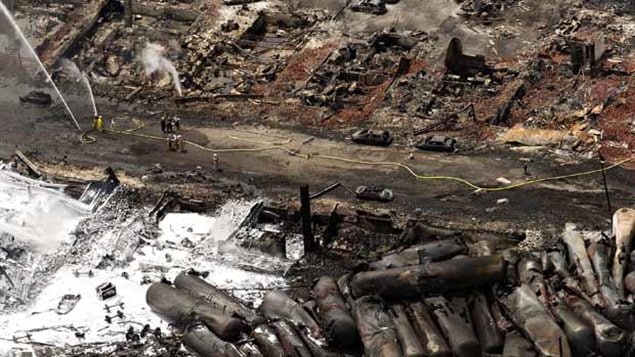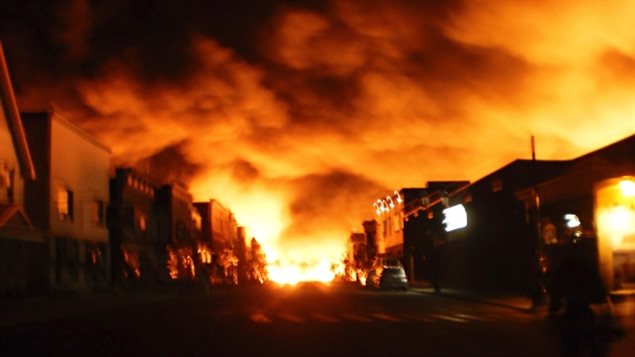Images of violent inferno in the middle of small Quebec town were seen around the world on this day three years ago.
Known as the Lac Megantic rail disaster, a freight train carrying highly flammable fuel crashed and exploded in the centre of the small town, killing dozens and destroying the town centre.
Canada’s Prime Minister released a statement today which reads in part, ““To the people of Lac-Mégantic, please know that you have our steadfast support as you continue to recover and heal. We remember you and all that you lost, and will use this memory to strengthen our resolve to make our railroads the safest in the world, and ensure the tragic events of Lac-Mégantic never happen again.”
The rail line passing through the town of Lac Megantic was created in 1880 as part of the Canadian Pacific Railway (CPR) transcontinental system between Montreal, Quebec and Saint John, New Brunswick.

It had been bought in 2003 by the American line, Montreal, Maine and Atlantic (MMA).
Late at night on July 5, the lone engineer parked the train on the main track at a place called Nantes Quebec, which has a 1.2 percent grade downhill to the town of Lac Megantic, about 11 kilometres away to the east.
The long train had five locomotives, a loaded boxcar as a buffer, a remote control car (needed for single engineer operation), and 72 tankers filled each filled with over 100-thousand litres of Bakken crude, a somewhat volatile oil.
The single engineer operating the train, left it parked on the main line, as the siding was used by the MMA to store boxcars. Had he parked it on the siding, a derailer would have been able to stop the train. However, having setting the hand brakes on all five locomotives, and on a buffer car and on one other car and left one engine running to power the air brakes, he left the train for the night after reporting to his controller in Maine that the engine had been emitting an abnormal amount and colour of smoke. He also tested the braking, but made the mistake of testing the brakes with the airbrakes on, which gives a false sense of security.

Shortly before midnight on the 5th, a fire broke out in the engine, and firefighters arriving shut the engine down before extinguishing the small fire.
With the engine off, the airbrakes began to slowly bleed off pressure on brakes throughout the train. The limited number of handbrakes could no longer hold the train and it began to roll down the track. By the time it reached Lac Megantic it is estimated the train was moving at a little over 100 km/h. The track curves as it passed through the downtown area and speed limit for trains is 16 km/h through this area.
At just after 1 A.M. the train with the few handbraked wheels screeching and sparking thundered into town and derailed, the tank cars crashing into each other spilling the fuel which explosively ignited into an inferno in the centre of town and spreading rivers of fire through the small downtown.
The fire burned with incredible heat burned for two days before it could be extinguished,

The result was the virtually destruction of the city centre, with some 30 buildings destroyed, several being irreplaceable historic buildings, and 47 people were killed, making this the fourth worst rail disaster in Canadian history.
Investigations blamed the MMA for several aspects of poor safety standards. MMA declared bankruptcy and although it operated for a few months afterward, was sold to the Central Maine and Quebec Railway.
Engineer Tom Harding, railway traffic controller Richard Labrie, train operations manager Jean Demaitre and defunct railway company Montreal Maine and Atlantic Railway have each pleaded not guilty to 47 charges of criminal negligence causing death. In June of this year, Harding’s lawyer was in court asking for a stay of proceeding against his client. The trial for the other accused will be heard in September. 2016.
additional information-sources
- Transportation Board Investigation
- Transportation Board Investigation summary
- TSB assessment of actions re; its recommendations
- CBC- Feb 2016- residents still suffer
- Statement of the Prime Minister on this third anniversary
- Globe and Mail, K MacKreal- July 2015
- Canadian Press (Globe and Mail) June 20, 2016- trials







For reasons beyond our control, and for an undetermined period of time, our comment section is now closed. However, our social networks remain open to your contributions.